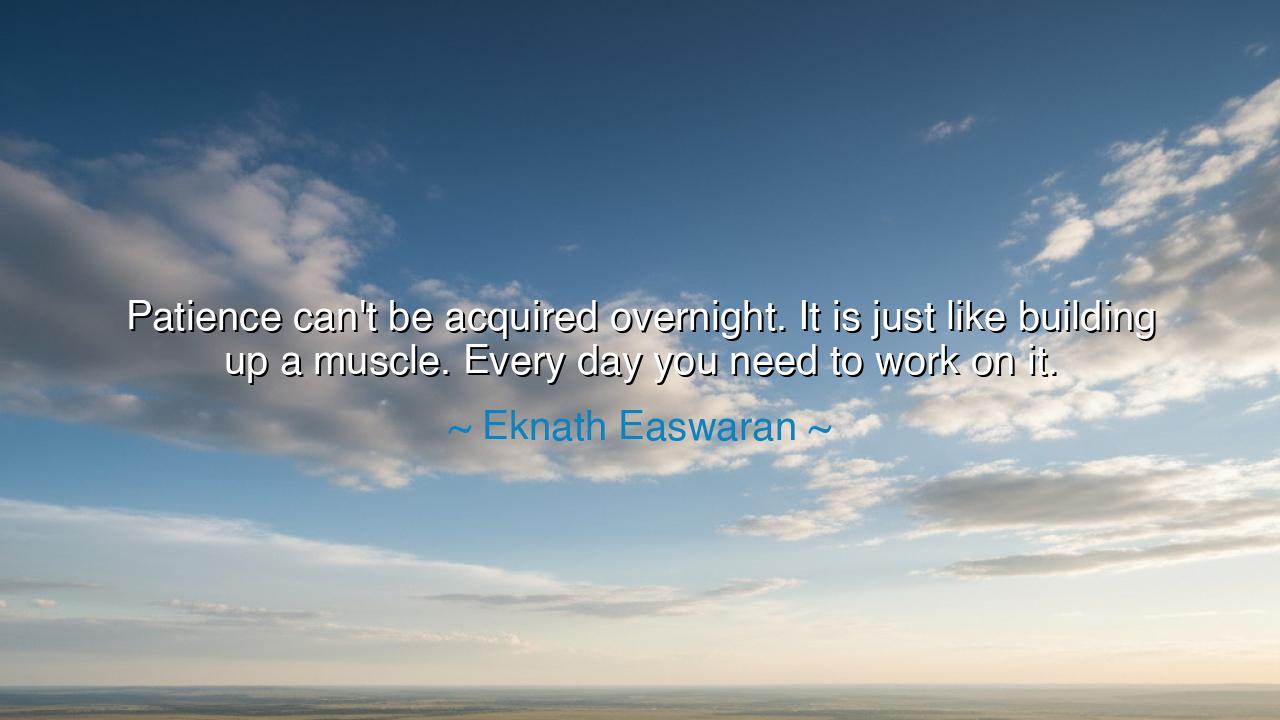
Patience can't be acquired overnight. It is just like building
Patience can't be acquired overnight. It is just like building up a muscle. Every day you need to work on it.






Hear the words of Eknath Easwaran, spoken with the calm force of a sage: “Patience can’t be acquired overnight. It is just like building up a muscle. Every day you need to work on it.” These words are not soft, but strong. They remind us that patience is not a gift dropped into our hands, nor a talent bestowed upon the lucky few. It is a discipline, forged by practice, strengthened by trial, and grown through repetition, just as the warrior builds his strength by lifting the sword day after day.
The ancients knew this well. The farmer did not curse the soil when the harvest delayed, for he knew that growth takes time. The archer did not expect mastery from his first shot, but drew the bow again and again until his body learned the art. So too is patience a training of the soul, a muscle that grows only through daily exercise. Without practice, it remains weak; with practice, it becomes the foundation of endurance, wisdom, and peace.
Easwaran’s image of the muscle is both simple and profound. When a man first lifts weight, his arms tremble, his body aches. But through persistence, the weakness gives way to strength. In the same way, the heart that seeks patience falters at first, restless, angry, or anxious. Yet if each day he chooses restraint, calm, and endurance, the soul grows stronger. One day, what once felt impossible becomes natural, and he discovers that patience has become part of his very being.
History offers us mirrors of this truth. Consider Mahatma Gandhi, whose struggle for India’s freedom was not won in haste, nor in a single act. It was built through years of patience, of enduring prison, insults, and setbacks, always refusing violence, always waiting for the right moment to act. His strength was not sudden—it was cultivated daily, like a muscle made strong by discipline. And through this patience, he moved the hearts of millions and shook the foundations of empire.
The deeper meaning of Easwaran’s words is this: we must abandon the illusion of instant transformation. Just as no body becomes strong in a single night, no soul becomes patient in a single prayer. The modern mind desires speed, but the eternal truth is slow growth. Patience is born in the small choices of daily life—waiting without anger, listening without interrupting, enduring without complaint. Each choice, like each lift of the weight, builds invisible strength, until the day comes when the soul stands unshaken in the face of storms.
The lesson for us is clear: do not despair if you lack patience today. Instead, begin training it, as the athlete trains his body. In moments of delay, choose calm. In moments of anger, choose silence. In moments of hardship, choose endurance. These small acts are the repetitions that build the great muscle of patience. With time, what now feels heavy will become light, and what now feels impossible will become natural.
Practical actions await you: set aside moments each day to pause and breathe when you feel rushed. Embrace small frustrations as opportunities to strengthen your spirit. Reflect daily on your progress, not with judgment, but with gratitude for growth. And most of all, persist. For just as the stone is shaped by countless drops of water, your soul will be shaped by the countless acts of patient endurance you practice each day.
Thus let Easwaran’s words echo across the generations: “Patience can’t be acquired overnight. It is just like building up a muscle.” Train this muscle, and you will discover the strength to endure hardship, to cultivate peace, and to face life with courage. For the one who masters patience does not merely wait—he triumphs over time itself.






AAdministratorAdministrator
Welcome, honored guests. Please leave a comment, we will respond soon